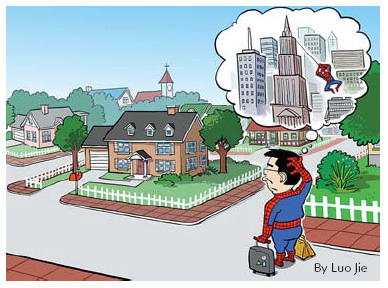Raymond Zhou
1989 quake jolted sense of what makes US tick
Updated: 2009-11-16 07:43
By Raymond Zhou (China Daily)
My first stop to the United States was San Francisco. It was Oct 17, 1986, exactly three years before the Loma Prieta earthquake.
"The nation of the beautiful", as America is spelled out in Chinese, did not jibe with my expectations. I imagined flying to a canyon of concrete and steel with one high-rise after another. But instead of a landscape of Manhattans, I was greeted with a rolling vista of low-rises or wilderness.
It was a big letdown. "This is not the America I saw on TV! This is just like the countryside!" I thought to myself. Years later, I found many of my countrymen shared my first impression. We just did not vocalize it for fear of appearing boorish.

It took me a while to realize the virtue of low density and open space. But people with memories of poverty can never shake off our obsession with skyscrapers, which we equate with modernity. It's not for economic reasons, but more out of a psychological need. If we want to stand tall, our buildings have to stand tall - sky-piercingly tall.
The US truly impressed me on two fronts: highway networks and supermarkets. Now I remind our younger generations that it was only in the 1980s that we had stopped handing out food rationing coupons. Private vehicles were almost nonexistent. The transition from a land of scarcity to one of abundance could be summed up with one question: "When can we live like Americans?" followed by the muttering of: "Probably not in my lifetime." Nobody would believe it if someone had predicted "You can do it - and in only two decades", at least in regards to freeways and supermarkets.
Americans take these things for granted. They have not lived through a time when every service person behaved like Nurse Ratched in One Flew Over the Cuckoo's Nest. I believe that a country's good side is more easily appreciated by outsiders, while its deep-seated ills can be better diagnosed by its experts. This applies to either the US or China, or a province or a small town.
During my years in the San Francisco Bay Area, I escorted a lot of visitors from China and picked their brains for insight. Only once did I encounter one - a professor with some status - who went out of his way to search for the US' ugly side. He was elated when he spotted a homeless person crouching by the road. It was his "Aha!" moment, proving everything he thought of the country. I asked him: "Do you know why these people do not have a shelter? Do you know how much aid they get from the government and charities?" He was not interested in anything deeper. What appeared on the surface had satisfied him.
Many years later, when I encounter Western reporters with a similar mentality, it would often remind me of that "expert". It is not that China does not have any blemishes, but whether you as an outsider approach it with fairness and without preconceived assumptions. If you dig deeper, you'll find nothing is as simple as it looks. Every cloud has a silver lining, and every bright spot has dark edges.
The 1989 earthquake gave me a full panorama of American behaviors. As the quake struck, I was at the center of Chinatown and had to walk all the way to the west end of the city. Streets were jammed with vehicles, traffic lights were not working. Yet there was hardly any gridlock. Every driver took every intersection as a stop sign. As it got dark, volunteers stood at crosswalks directing traffic with a flashlight covered with a piece of red cloth. It was a touching sight.
On the other hand, some 7-Eleven stores hiked prices. (They were later penalized by the franchise company.) A natural disaster on that scale always brings out the best and the worst in people. From that experience I learned what makes the great is not skyscrapers, freeways or engineering marvels. Ultimately, it is the people.
Specials

President Hu visits the US
President Hu Jintao is on a state visit to the US from Jan 18 to 21.

Fossil mom helps shed light on ancient life
The discovery of the fossile of a female pterosaur nicknamed as Mrs T and her un-laid egg are shedding new light on ancient mysteries.

Economic figures
China's GDP growth jumped 10.3 percent year-on-year in 2010, boosted by a faster-than-expected 9.8 percent expansion in the fourth quarter.



